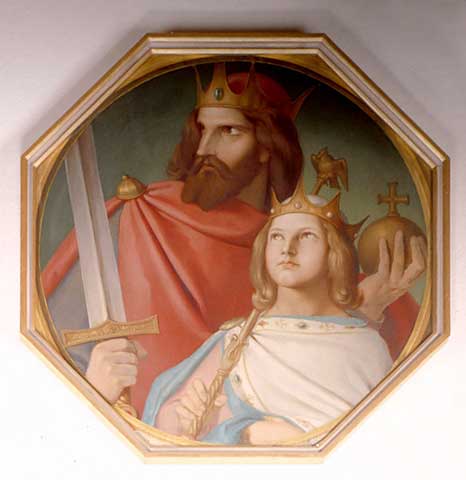Criminal History, 199
For the context of these translations click here.
PDFs of entries 1-183 (several of Karlheinz Deschner’s
books abridged into two) can be read here and here.

Arnulf of Carinthia and Louis the Child by Johann Jakob Jung (1840).
The (German) drive eastwards
King Arnulf had a new palace built in Regensburg. The city had already been the central palace of Louis the German, a centre of the mission to the East, and of caravan trade with Bohemia, Moravia and Hungary—everything essentially Christian and Western world was concentrated here: the power of state, church and money. Regensburg became the city with which Arnulf (who often, like his father and grandfather, also visited the palaces of Ötting and Ranshofen) probably felt the closest connection, where a third of his charters were issued and held at least four imperial assemblies and numerous stays are attested. For researchers, this choice of his heartland not only reflects his past, ‘but also the emphasis on the tradition of Louis the German and the priority given to south-east policy, but also Arnulf’s keen sense of political realities’ (Störmer). In other words, the German urge towards the East, already evident in King Arnulf, is already clear.
Immediately after his coup d’état he retired to consolidate his position on his most important power base, now strong enough to easily suppress the attempted rebellion of his younger cousin Bernhard in Swabia. Bernhard (ca. 876-891/89), illegitimate like Arnulf, was the son of Emperor Charles III, who in 885 was unable to secure Bernhard as heir to the throne (just as Charles also failed to adopt Louis, son of Boso of Vienne and a Carolingian on his mother’s side, two years later). However, Bernhard, who sought to re-establish his father’s original kingdom, did not want to relinquish his rights to the throne even after Arnulf’s elevation to East Frankish king. In 889, he allied with nobles from Raetia and Alemannia, including Abbot Bernhard of St. Gall (then deposed by Arnulf). Still, he was killed a year later when Margrave Rudolf of Raetia defeated the Putsches.
Arnulf himself marched against the Abodrites in the late summer of 889 as the leader of a strong army, having met with his men and many bishops, including Sunderold of Mainz and Willibert of Cologne, in Frankfurt shortly beforehand. However, this time he was unable to achieve anything in the north and once again celebrated ‘the Lord’s birthday in Regensburg in a dignified manner’.
And he continued to go to church, go to war, pray and kill all the time. In particular, Arnulf intervened almost continuously in Moravia in the last years of the 9th century. He had made peace with it in 985, as it had gradually become too strong, and had even made Swatopluk the godfather of his son Zwentibold. But all this did not last long, and soon they returned to their usual mode of communication.